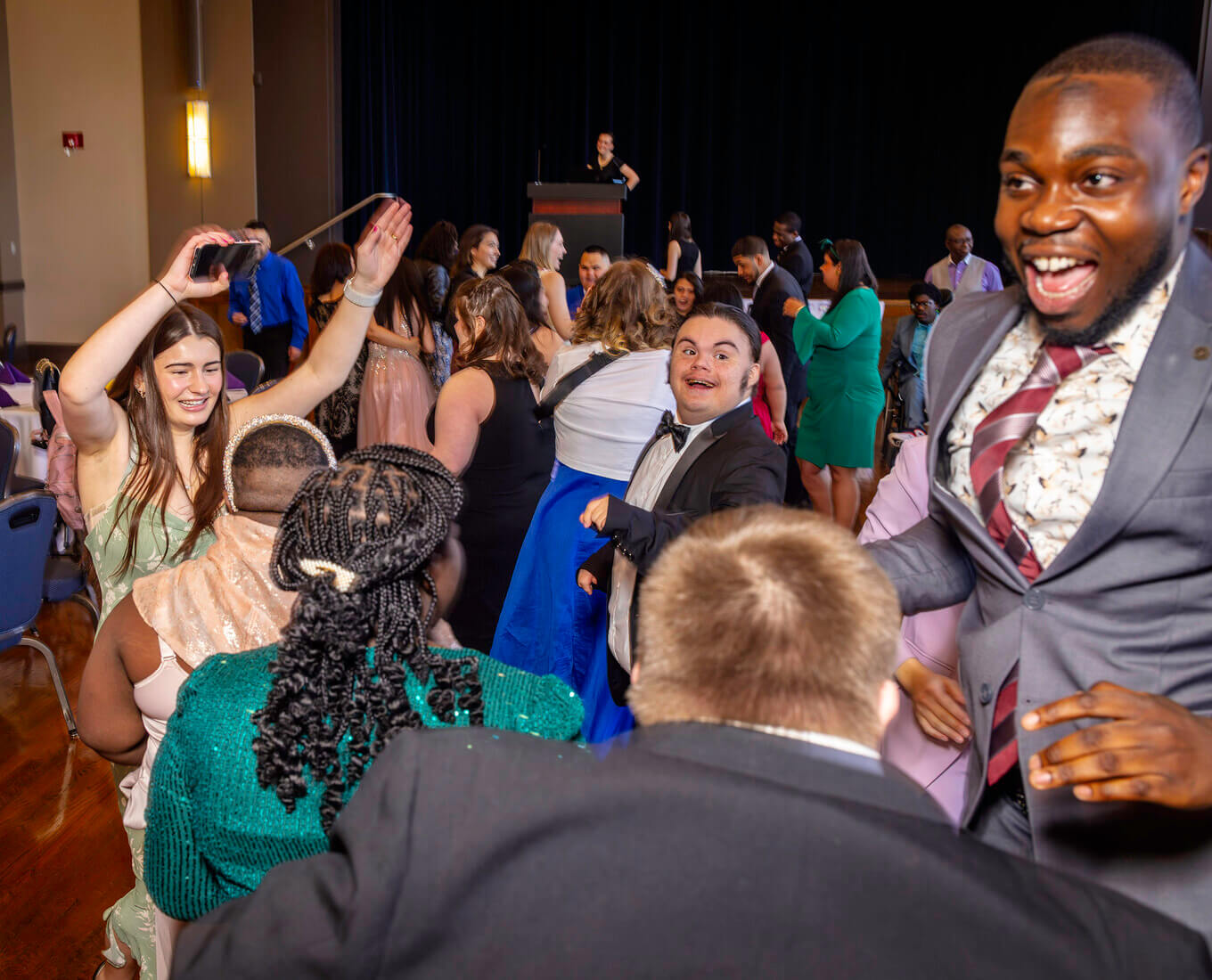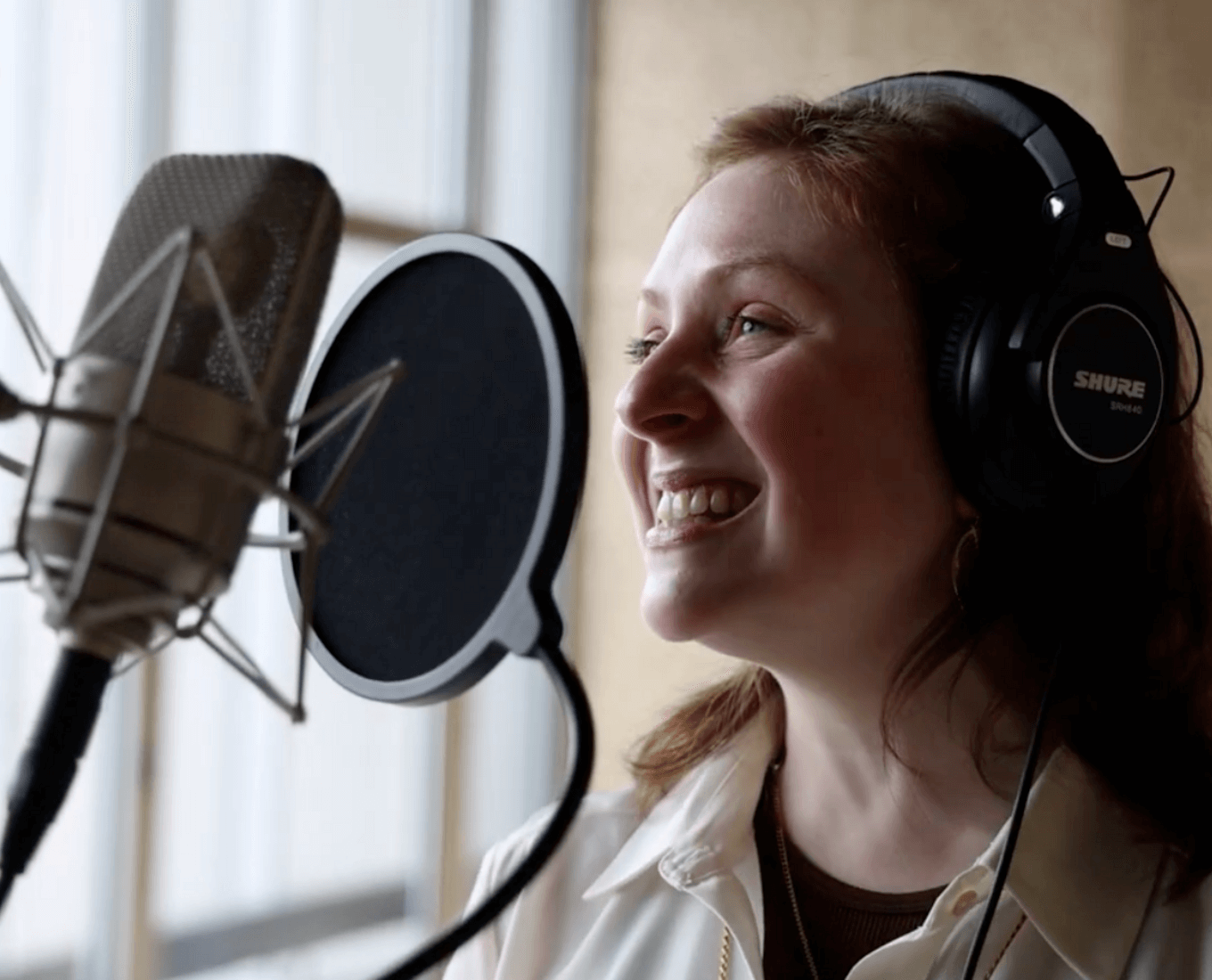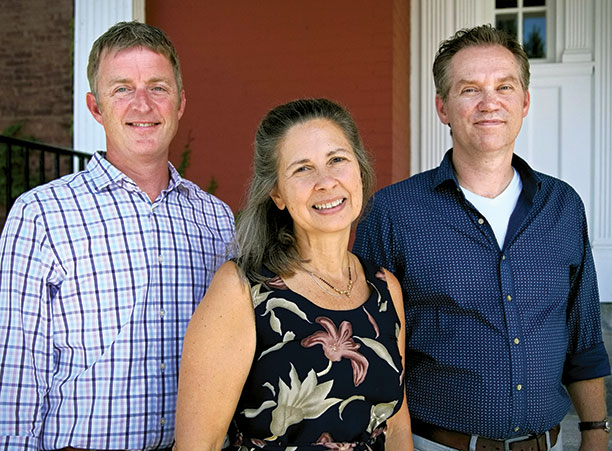 After years of dedicated teaching and research in their respective fields, five Holy Cross faculty members have been promoted to the rank of full professor. We asked them a few questions about their scholarship — and more:
After years of dedicated teaching and research in their respective fields, five Holy Cross faculty members have been promoted to the rank of full professor. We asked them a few questions about their scholarship — and more:
Amy Singleton Adams, modern languages and literatures
Amy Singleton Adams, of the Russian program in the modern languages and literatures department, earned a B.A. in Russian language and literature from Dartmouth College and an M.A. and Ph.D. in Slavic languages and literatures from the University of Wisconsin-Madison. Her research focuses on aspects of Russian culture and society that are expressed symbolically in art, literature and icons. She has been a member of the Holy Cross faculty since 1993.
What is your proudest accomplishment at this point in your career?
I’m grateful to be a member of the community of researchers and scholars who try to understand Russia in accurate and nuanced ways through its history, arts and literature, politics and beliefs. Expertise on Russia is more important than ever and I appreciate the College’s unwavering commitment to Russian studies over the years. Holy Cross Russian students who train with us go on to impressive careers in law, government service, education and nonprofits. To know that a student learned the Russian alphabet in our classroom and then ended up getting a national scholarship, working at the State Department or going to law school is what makes me most proud.
What piece of Russian literature should be read by everyone interested in Russia?
That’s a really hard question to answer, so I’ll list some of my students’ favorites. For the 19th century, it’s a toss-up between "Anna Karenina" and "Crime and Punishment." For the 20th, "The Master and Margarita" is the most popular — plus, it’s funny. My new favorite is "The Big Green Tent" by contemporary author Liudmila Ulitskaia. It's an epic tale of the Soviet era from the 1950s to the 1990s seen through the eyes and lives of three school friends. It’s the smartest new book I’ve read in a long time.
Sahar Bazzaz, history
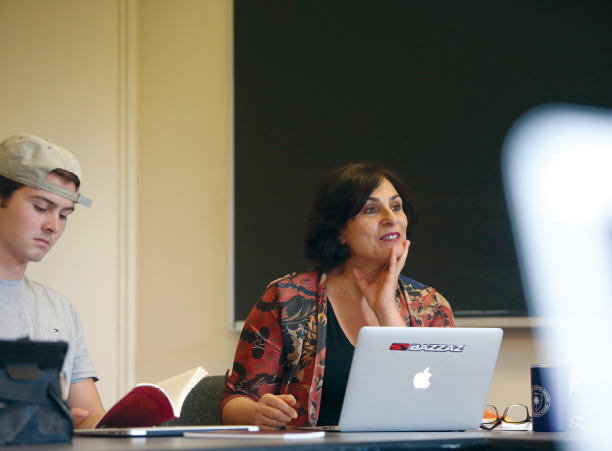 Sahar Bazzaz speaks while teaching a class. Photo by Tom Rettig
Sahar Bazzaz speaks while teaching a class. Photo by Tom RettigWhat is your proudest accomplishment at this point in your career? My proudest accomplishment relates to my work as a member of the Comparative Cultures Seminar (CCS) in Greece, a teaching and research project connected to Harvard Summer School of which I was a founding member in 2002. This summer seminar takes as its subject the history and cultures of the eastern Mediterranean region from antiquity to the present. Designed to be teaching and research intensive, this program has been a labor of love, to which I have dedicated great time and energy. In the CCS program, I have taught interdisciplinary seminars that explore the connection between the rise of modern social science disciplines and European colonialism and imperialism in North Africa and the Middle East. Furthermore, my involvement in the CCS program helped me develop new courses, which I now teach at Holy Cross.
What's one thing about the Middle East that everyone should know? Newspapers and other media outlets are filled with largely monolithic and reductive depictions and images of the Middle East, which tend to reduce the complexity of the region and its peoples, on one hand, and to obscure the vibrant diversity of human experiences that have shaped the region, on the other. Everyone should take a course (or two or three!) about the history of the region.
Leon Claessens, biology
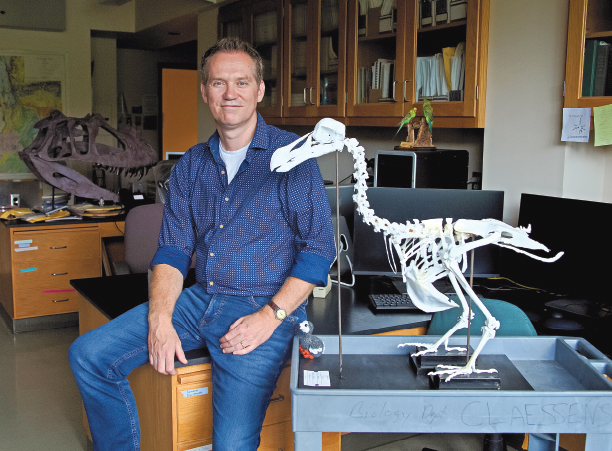 Leon Claessens poses with a dodo skeleton. Photo by John Buckingham
Leon Claessens poses with a dodo skeleton. Photo by John BuckinghamWhat is your proudest accomplishment at this point in your career? The monograph on the extinct dodo that my colleagues and I published in 2015, the first description of a complete dodo skeleton and the first major publication on the anatomy of this iconic bird in 150 years, is something that I am very proud of. We were able to put together this scientific treatise thanks to the rediscovery of the only skeleton of a single individual dodo bird in existence, more than a century after the skeleton was discovered by an amateur naturalist on the island of Mauritius, the only place where the dodo lived.
Why did you choose to study paleontology? Where did that interest come from? I've been interested in traveling the globe to discover lost ancient artifacts ever since I was 4 years old and received a book on exploration from an aunt and uncle. As I moved through elementary school, this interest became firmly anchored on finding fossils and learning about the history of life on Earth, and it has largely stayed that way ever since. At some level, I never quit playing in sandboxes.
Joshua Farrell, chemistry
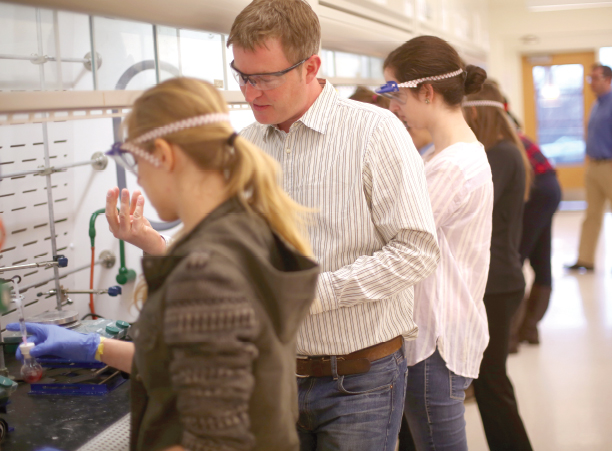 Joshua Farrell helps a student with a chemistry experiment. Photo by Tom Rettig
Joshua Farrell helps a student with a chemistry experiment. Photo by Tom RettigWhat is your proudest accomplishment at this point in your career? The accomplishment that gives me the greatest joy is each time a student is included as a co-author on a peer-reviewed research paper. In each instance, this means that a student made a lasting and permanent contribution to the field of chemistry. It is an important milestone for a student to take on a research project and follow through to completion. In order to get their work to a publishable state, they always have to learn to deal with failure, have to pay close attention to detail, and often have to change their approach and adapt to what they learn. These papers especially help students early in their career and often come up at or help them get interviews for wherever they are heading after Holy Cross.
Can you tell us about the experience of teaching at your alma mater? What's that like? When I was at Holy Cross as a student in the early ’90s, the chemistry department felt like a family. The professors were universally excellent at their craft and really cared about the individual students. Chemistry majors worked long hours in lab, on research and on problem sets together, and forged close relationships with one another. When I returned to Holy Cross in 2002, much of the chemistry faculty had turned over, but we now have 13 tenured and tenure-track professors who maintain the same sense of excellence and family that I remember as a student. I love working in a department where the faculty are highly supportive of one another and the students are motivated to work hard.
Maria Guadalupe M. Rodrigues, political science
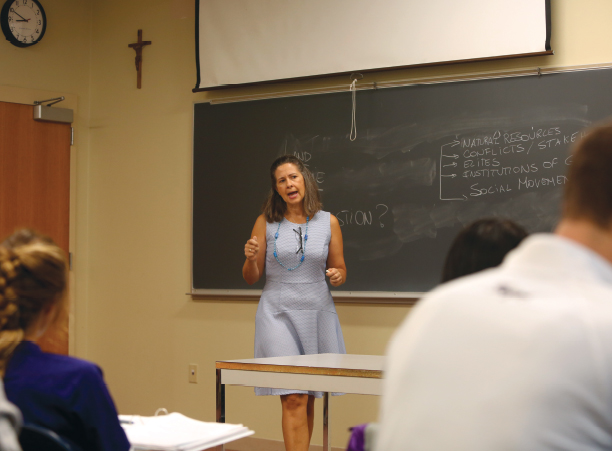 Maria G. M. Rodrigues lectures at the front of a class. Photo by Tom Rettig
Maria G. M. Rodrigues lectures at the front of a class. Photo by Tom RettigWhat is your proudest accomplishment at this point in your career? To have directed the Latin American, Latinx and the Caribbean Studies Program at Holy Cross for the past three years. This was a period when people from Latin America and Caribbean, as well as the Latinx community in the United States, felt extremely threatened and rejected by sectors of American society. I was proud to be able to foster, together with my colleagues in the program, a nurturing and supportive environment for our students, whether they felt connected to Latin America intellectually, culturally or due to their heritage.
You've done a lot of service for the greater Boston area. Can you tell us about one of the projects you've worked on? After doing so much research on global activism, the universe conspired to place me at the center of a few big storms in my own community. The Catholic Church in Boston closed my oldest son's parochial school, and together with my husband and a few committed families with children in that school, we mounted a campaign to buy the school from the Archdiocese. We wanted to establish a community center that could continue to play the role the parochial school had once played, that of a community anchor. After a few years of advocacy, we finally bought the property. This was 15 years ago. Today, the former school is a beautifully renovated community center housing a preschool, services for seniors, an after-school program, a farmer's market and a community function room for events.
Written by Jane Carlton for the Fall 2018 issue of Holy Cross Magazine.
About Holy Cross Magazine
Holy Cross Magazine (HCM) is the quarterly alumni publication of the College of the Holy Cross. The award-winning publication is mailed to alumni and friends of the College and includes intriguing profiles, make-you-think features, alumni news, exclusive photos and more. Visit magazine.holycross.edu/about to contact HCM, submit alumni class notes, milestones, or letters to the editor.

